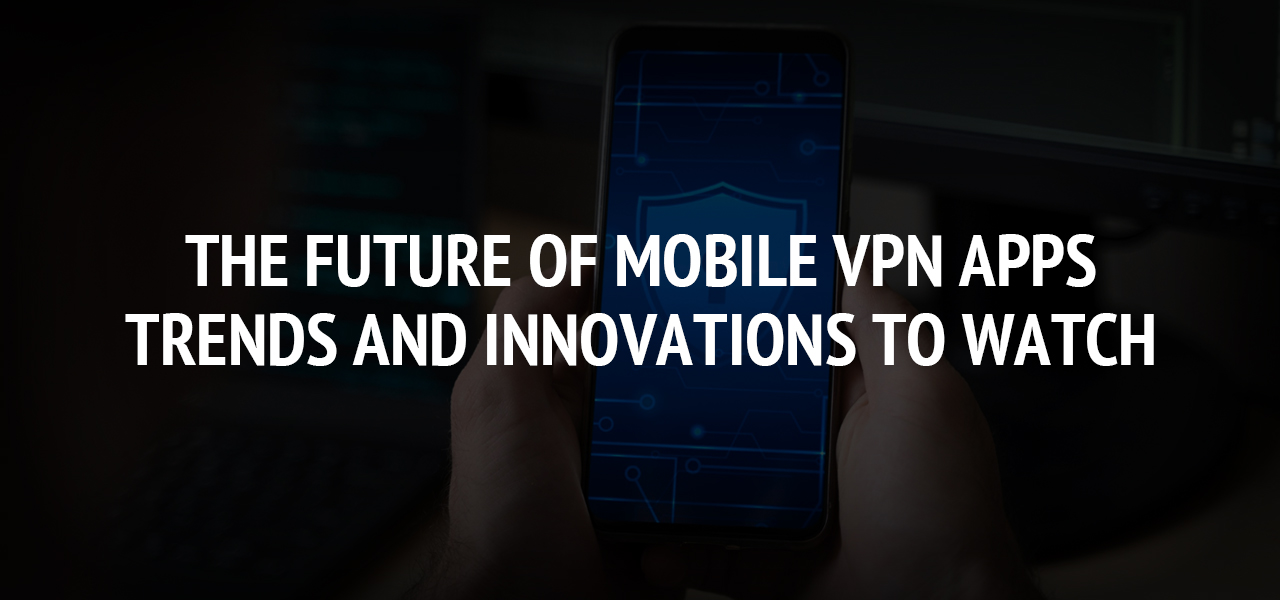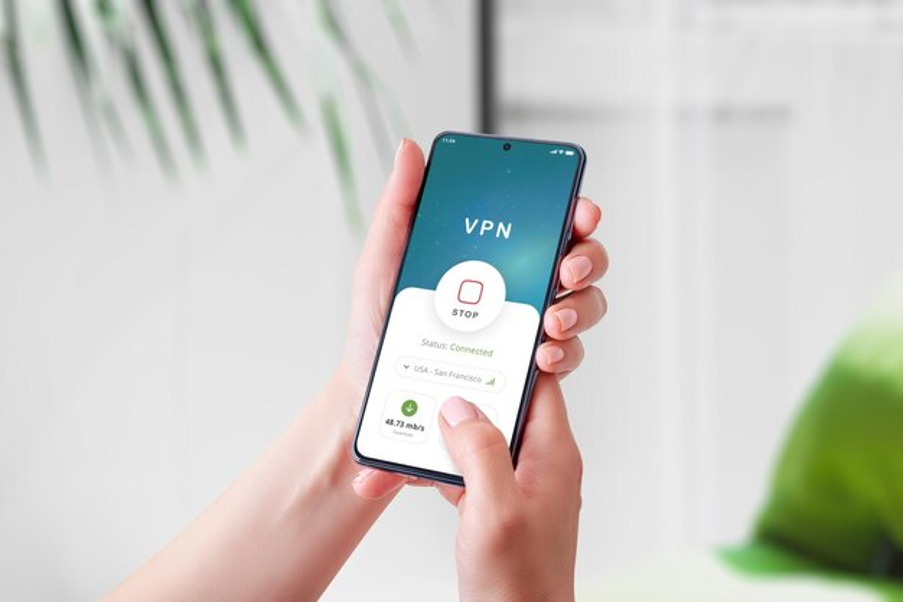The Future of Mobile VPN Apps: Trends and Innovations to Watch

As our reliance on smartphones grows, so does the importance of protecting our online privacy. Mobile VPN (Virtual Private Network) apps have become essential tools for securing our internet connections, especially in an age where data breaches and cyber threats are increasingly common. But what lies ahead for these apps? In this article, we explore the future trends and innovations shaping mobile VPNs and what users can expect in the coming years.

1. Strengthening Security and Encryption
The main purpose of a VPN is to provide a secure way to access the internet, keeping your data safe from hackers and other prying eyes. However, as cyber threats evolve, VPN providers are under constant pressure to enhance their security measures.
Most mobile VPNs currently use encryption methods like AES-256, which is highly effective at keeping data safe. However, with advancements in technology, particularly in quantum computing, these encryption methods could become vulnerable. To counteract this, VPN providers are exploring new, quantum-resistant encryption techniques. These techniques aim to remain secure even in the face of powerful quantum computers, which are expected to grow into a $10 billion market by 2027.
2. Leveraging AI and Machine Learning for Better Protection
Artificial Intelligence (AI) and Machine Learning (ML) are transforming industries across the board, and the VPN sector is no different. In the future, AI and ML are set to play an even larger role in making VPNs smarter and more effective.
One of the key areas where AI can make a difference is in threat detection. By analyzing patterns in internet traffic, AI algorithms can quickly identify suspicious activities or potential cyber threats. For example, if someone tries to access your account from an unfamiliar location, an AI-driven VPN app could automatically block the connection to prevent unauthorized access.
Furthermore, AI can improve the overall user experience by optimizing server selection. Imagine your VPN app automatically choosing the fastest and most secure server based on your location and network conditions, all without you having to lift a finger. This is not just a possibility; it's an emerging reality as AI continues to advance. The AI cybersecurity market is projected to reach $38.2 billion by 2026, highlighting the growing importance of AI in digital security solutions.

3. The Rise of Decentralized VPNs (dVPNs)
While traditional VPNs route internet traffic through centralized servers, decentralized VPNs (dVPNs) use a network of distributed nodes to offer a more private and secure connection. This innovative approach has significant advantages, particularly in regions with high censorship or internet restrictions.
Decentralized VPNs work similarly to peer-to-peer networks, where users share their bandwidth with each other. This setup not only improves privacy but also enhances resilience against shutdowns and attacks. For example, dVPNs like Mysterium, Sentinel, and Orchid are gaining popularity for their ability to provide more reliable connections and resist government censorship efforts.
For users seeking robust privacy features, dVPNs offer a compelling alternative to traditional VPNs. They provide a way to maintain internet access and privacy even in environments where digital freedoms are under threat. As the global VPN market is forecasted to reach $107.5 billion by 2027, dVPNs are poised to become a significant player in the industry.
4. Expanding Beyond Privacy to Offer More Features
While the primary role of VPNs is to protect user privacy, future VPN apps are likely to offer a broader range of features to meet diverse user needs. Mobile VPNs are increasingly being integrated with additional services such as ad blocking, malware protection, and data compression.
Consider a scenario where your VPN app not only encrypts your data but also blocks intrusive ads and scans for malware. This all-in-one approach offers a comprehensive digital security solution, eliminating the need for multiple apps. VPN providers like FastVpn by Namecheap and ExpressVPN are already moving in this direction, bundling these services together to offer more value to their users.
Another exciting development is data compression, which can help users save on mobile data costs by reducing the amount of data sent over the network. If you’re considering a premium app, you can also use ProxyCoupons to grab discounts on mobile VPNs with robust feature sets. This is particularly beneficial in regions where mobile data is expensive or where network speeds are slow. Such features are becoming increasingly important for users who demand both security and performance from their VPN apps.
5. Focusing on User Experience and Accessibility
As VPNs gain popularity, there is a growing emphasis on making these apps easier to use. In the past, VPNs were often seen as tools for tech-savvy users, but now, a broader audience is adopting them. This shift means that VPN providers need to focus on improving the user experience.
Future VPN apps will likely prioritize user-friendly interfaces, with features like one-click connections and automatic server switching to simplify the user experience. The goal is to make VPNs accessible to everyone, regardless of their technical knowledge. Research shows that about 26% of internet users worldwide use a VPN or proxy server to access the internet, highlighting the need for user-friendly designs.
Additionally, optimizing app performance is crucial. VPNs that minimize battery usage and data consumption will be more appealing to mobile users who are mindful of their device's performance. For those using an unlimited VPN for Android smartphones, these optimizations will enhance the overall experience, making the app more reliable and efficient.
6. Adapting to Regulatory Challenges and Compliance
As VPN usage continues to grow, so does the scrutiny from governments around the world. Different countries have different laws regarding VPN use, and navigating these regulations can be challenging for providers.
VPN companies must develop strategies to comply with these diverse regulations while maintaining strong privacy protections. This could involve setting up servers in specific regions to comply with local data laws or creating specialized versions of their apps for certain markets. For example, countries like China and Russia have strict VPN regulations, and other nations may follow suit.
Transparency is also becoming more important. With global privacy laws like the General Data Protection Regulation (GDPR) in Europe and the California Consumer Privacy Act (CCPA) in the U.S., users are more aware of their digital rights. VPN providers need to be clear about their data policies and practices to build trust and ensure compliance.
Conclusion
The future of mobile VPN apps is set to be dynamic and innovative, driven by advancements in technology and changing user needs. From enhanced security and AI integration to decentralized networks and new features, VPNs are evolving rapidly to meet new challenges and opportunities.
For users these developments promise better protection, faster speeds, and more user-friendly experiences. As digital privacy becomes more crucial, VPN providers must continue to innovate to offer the best possible service in an ever-changing digital landscape. The coming years are sure to bring exciting changes, making VPNs more integral to our online security than ever before.
About The Author
Related Blog
View All-
What are the Effective Ways to Promote a Small Business App?
According to Statista, there are about 3.48 million apps in the Google Play Store. Massive! Isn’t it? Now, if your business app, too, holds a space in the vast channel of Google Playstore, or even Apple App Store for that matter, know what you must do to ...
-
What Is Sales Bookings?
Sales bookings form a pivotal element in the financial landscape of any business, providing insights into future revenue and the potential growth trajectory. They signify commitments made by clients to purchase goods or services, serving as a snapshot of sales ...







